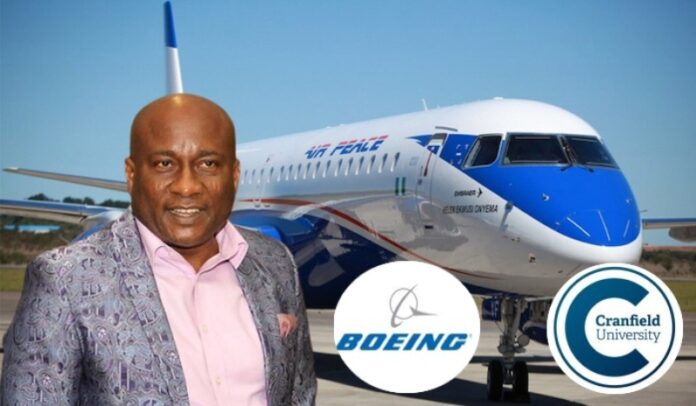Air Peace has formed a strategic partnership with the Boeing Company, and Cranfield University, to fortify safety culture and operational excellence in the airline.
Spokesperson for Air Peace, Dr Ejike Ndiulo, disclosed this in a statement.
Working under the umbrella of Boeing Global Learning Institute (BGLI), the aircraft manufacturer held a workshop under the theme ‘Advanced leadership in safety excellence’ which assembled all the executives, post holders and management leadership of the various departments of the airline in a five-day in-person classroom training to sharpen their safety leadership skills, transform the workplaces’ safety culture, gain practical tools to implement the new knowledge, thus fostering a culture of continuous improvement within the organisation.
“The partnership between Air Peace and Boeing is borne out of a shared commitment to shaping the future of aviation leadership.
“Over the years, Air Peace has recognized that a deep, unwavering commitment to safety is key to its continued success.
The programme aimed to build upon that vision, enabling executives to lead with confidence, manage risks effectively, and create high-performing teams that prioritize safety at every level,” the statement said.
The senior organisational consultant and programme manager, BGLI, Harry Magui said the Boeing Company “has long recognised the importance of supporting continuous learning of our aviation partners.
“To that end, the Boeing Global Learning Institute designs and delivers numerous learning programmes to both emerging and established leaders of our partners.
“These efforts aim to develop leadership, business, and technical skills so that our partners can improve their business processes, increase operational efficiency and enable leaders to strengthen their teams to ultimately grow their business,” he said
He also said that Air Peace has been phenomenal in advancing the aviation industry in Nigeria.
“So we are here to support them to harness more opportunities in the future with the Advanced Leadership in Safety Excellence Training for all its top leadership within the organization,” he said.
For his part, the head of aerospace at Cranfield University, Prof Graham Braithwaite, said the collaboration ensured that the training directly address the challenges Air Peace faces, culminating in real-world capstone projects that would have a lasting impact.
Reinforcing Braithwaite’s position, a lecturer on organisational resilience and change at the university’s school of management, Dr Fabian Steinmann, applauded the airline for the “great progress” it made over the years.
He said they were happy to learn and share knowledge and find ways to strengthen the system, making it robust and flexible to adapt to the ever-changing environment.
“Safety is at the heart of everything we do at Cranfield; so the privilege we have is that we travelled around the world, picked up the good practices, learned more about the culture and the operation in various countries. So, we are here to facilitate that exchange with Nigeria and Air Peace to see how we share some of the good practices and lessons learned from all around the world and translate them into their operation,” he said.
The programme’s curriculum was carefully crafted to blend theoretical insights with hands-on practical applications.
In the first phase, discussions led by Braithwaite and Steinmann set the stage by aligning Air Peace leadership’s operational insights with the program’s objectives.
The second phase provided participants with direct access to experts from Cranfield University and Boeing, equipping them with advanced tools and strategies for safety leadership.
Beyond the classroom, participants were empowered to implement their learning within their teams, creating a ripple effect that would strengthen safety systems across the organization.
“This class is quite essential and we are lucky to have our resource persons to impact knowledge on us. It is a well-structured training and especially for Air Peace because of where we are now and where we hope to go in the future.
“The whole essence of this class is to reinforce what we know before and be exposed to other avenues of learning. The aviation industry is ever-changing and dynamic, and Air Peace has to be abreast of such developments,” the safety manager at Air Peace, Capt Godfrey Ogbogu, remarked.
He added: “Air Peace commitment to safety and operational excellence has never been more evident.
“The partnership has not only cultivated a deeper understanding of safety leadership but also laid the groundwork for a more resilient, accountable, and innovative workforce, poised to tackle the evolving challenges of the aviation industry.
The programme emphasised accountability through two follow-up review sessions, ensuring that participants continued to develop their leadership skills and advance their safety projects.
“This dual focus on personal leadership growth and organizational impact ensured that safety remained at the forefront of Air Peace’s operational strategy.
The Boeing Company is an American multinational corporation that designs, manufactures, and sells aircraft, rotorcraft, rockets, satellites, and missiles worldwide. The company also provides leasing and product support services.
Founded by William E. Boeing in Seattle, Washington, on July 15, 1916, the present corporation is the result of the merger of Boeing with McDonnell Douglas on August 1, 1997.
Cranfield University, on the other hand, is a British postgraduate-only public research university specialising in science, engineering, design, technology and management.
It was founded as the College of Aeronautics (CoA) in 1946 and through the 1950s and 1960s, the development of aircraft research led to growth and diversification into other areas such as manufacturing and management, and in 1967, to the founding of the Cranfield School of Management.
In 1969, the CoA was renamed the Cranfield Institute of Technology, was incorporated by royal charter, gained degree awarding powers, and became a university. In 1993, it adopted its current name.

























































